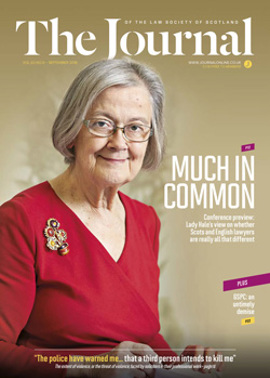Developing digital services
August was another busy month at RoS as we continued to develop existing services such as Digital Discharge Service (DDS) and ScotLIS, as well as get to work on new innovations.
DDS was launched in May last year, and has been an overwhelming success. Digital discharges deliver the highest level of security, offering peace of mind to both solicitors and their clients. One of the challenges of operating in a modern business environment is that people want, and expect, everything to be done more quickly – DDS delivers that, while also managing to cost the customer less rather than more. We have completed 27,802 digital discharges to date, and in July this year 36% of all securities were discharged via DDS.
The rollout of ScotLIS is another key work area for RoS.
The response from business users – there have been 30,243 since its launch – to ScotLIS has been incredibly positive, with customers reporting efficiency savings. One of the next steps will be making access for citizens easier and more affordable. We have so far had 88,932 public users since ScotLIS went live, and we look forward to seeing that number increase as we introduce simpler payment methods and reduce costs over the coming months.
We were also pleased to note that we are already seeing the benefit of our improved application form. The introduction of an electronic form was based on our recognition that rejections remain an ongoing source of frustration, and on consultation responses confirming that there was an appetite for digitalisation where possible. As a result of the change, rejections in the improved areas of the application form dropped from 472 in July 2017 to just seven in July this year.
Arrear update
The Keeper told delegates at the Law Society of Scotland conference in June that we were looking at ways to stabilise the arrear, and then to reduce it, and would update customers on our progress in achieving this.
The volume is still rising – which is what we expected to happen – but at a much slower rate, which is what we hoped would happen as a result of the measures we had put in place. The age of the casework is now coming down and as things stand, we have reduced the oldest casework in the arrear by 1,100 applications, which has also brought in the age of the arrear by a month.
Our next target is to ensure that, by the end of 2018, no case sitting with us will have an age of more than two years.
We have also made – and will hold good to – a commitment that no case that has been with us for longer than three months will be rejected unless it absolutely legally has to be.
We will continue to provide regular updates on how the arrear is being addressed, whether it’s the good news that we want to be giving you, or an update on how we are reviewing our approach if we aren’t getting there quickly enough.
Inclusive customer service
We were delighted to welcome the Scottish Trans Alliance (STA) to Meadowbank House last month to discuss some of the ways that RoS can support our transgender customers.
The Keeper met with James Morton, Manager of STA, to talk about one of the policies that we hope will make a real difference to our trans customers. We plan on promoting this to trans audiences over the coming months, and we anticipate that this may result in some people contacting their solicitors seeking guidance.
We know how important respectful recognition of trans people’s identities is, and it’s for that reason that we have procedures in place to ensure that trans customers updating their title sheets with new names accurately reflecting their identity are treated with dignity and respect. We also know that there are sensitivities around the erroneous use of the names trans people were formerly known as.
When we are told by a person that they are undergoing, or have undergone, a process of gender reassignment we will show only their new name on their title sheet and change existing entries in the securities section so that they no longer reflect the name used in the security deed, but instead reflect their new name as granter of a heritable security.
We hope that this will give customers some reassurance that we take trans equality seriously, and are keen to keep an open mind about other ways in which we can adapt our work practices, to ensure that we are always thinking about how best to meet the needs of all our customers.
You can find further details about this policy on the Knowledge Base.
In this issue
- Confidence restored: internal investigations and legal privilege
- Court reforms: still an unknown quantity
- Ruled out of court?
- Uncovering the environment (1)
- Medical death: a case to answer
- Reading for pleasure
- Opinion: Kerry Trewern and Rhona McNair
- Book reviews
- Profile: Ryan McCuaig
- President's column
- Developing digital services
- People on the move
- Leading judgment
- Health check
- Open to attack
- Claims: beating the trigger
- Storage: time for digital
- GSPC: eulogy for a friend
- Relevant persons: a challenge
- New specialist land registration practice launches
- Good enough reason?
- Copyright: underpinning control
- Writing means writing
- Rent moves: two crucial hoops
- Debtor wins in policy decision
- Scottish Solicitors' Discipline Tribunal
- KIR: the time bomb explodes
- The guideline goal
- GC NextGen: a network for you?
- Your Law Society of Scotland Council members
- Public policy highlights
- Double boost for Society's AML team
- Ask Ash
- Practice rights and the impact of Brexit: working in the EU
- Acting as notary: what do I need to know?
- Engagement letters: a practical approach
- Uncovering the environment
- Paralegal pointers






